Mother Rejects Daughter for Coming Out as Gay, Criticizes Her for Preferring a Cat Over Family
There are numerous different social interactions that might be referred to as relationships. Interpersonal connections, which are close, intense relationships between two or more people, are the main focus of relationship studies.
These connections are sometimes referred to as friendships, couples, or marriages. Intimate or sexual partnerships that are referred to as a partnership, couple, marriage, or simply a relationship are frequently the focus of research on LGBTQ+ interpersonal relationships.
Relationships differ in the internal and external resources that support them, contribute to the members' well-being, and help them manage the pressures they must deal with both individually and as a pair. For same-sex couples, the landscape is shifting due to the availability of external resources.
People who identify as LGBTQ+ may experience negative effects on their health and wellness if their family members reject them for their sexual orientation, gender identity, or gender expression. The OP of today's story was no different, as her relationship with her mom turned sour when she came out as a teenage lesbian.
OP and her mother were able to repair their relationship to a certain extent, but it was never the same. Deep down, OP cannot forgive the profound loneliness and despair she experienced as a lesbian teenager in a not-very LGBT-friendly country.
Now she's chosen to give all her attention to a cat and has noticed that her mother's irritation with her has increased. Read all about it as you scroll down below.
The Headline

OP and Her Mother Were Able to Repair Their Relationship to a Point, but It Was Never the Same
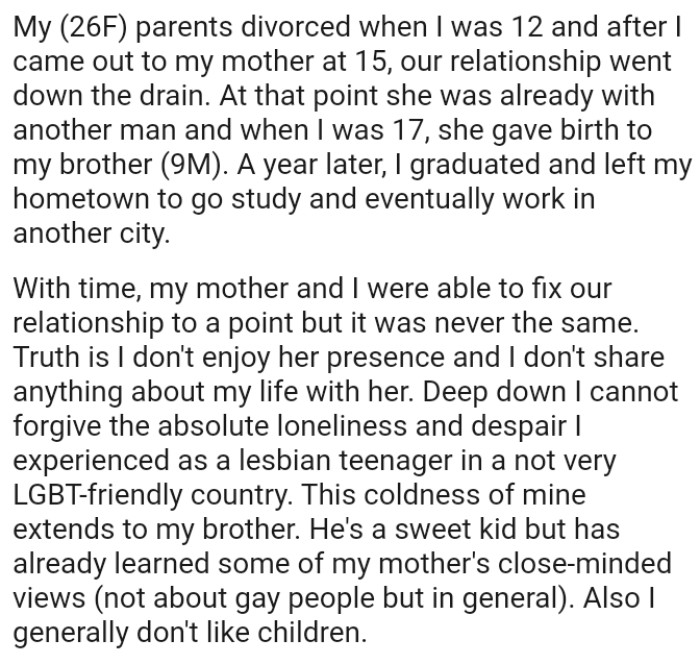
OP Suggested They Move to the City She Lived In So She Could Help Them Pay the Bills
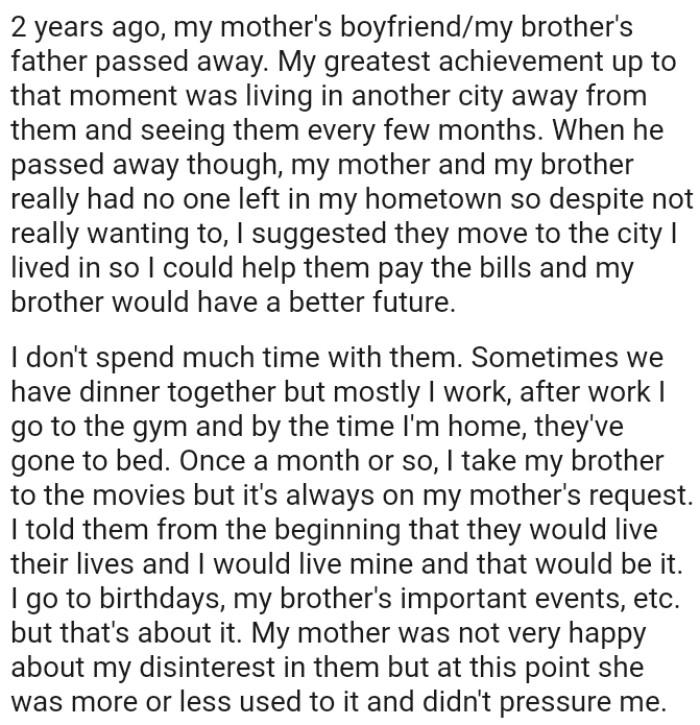
Exploring Family Dynamics and Acceptance
This situation underscores the complexities of familial relationships, especially concerning acceptance. Research in family psychology shows that rejection can have profound effects on individuals, often leading to feelings of isolation and emotional distress. Dr. Laura Berman, a renowned sex therapist, emphasizes that "parental acceptance is vital for a child's emotional well-being and identity formation." For further insights, her professional website offers valuable resources on family dynamics and acceptance: Dr. Laura Berman.
Understanding Family Rejection and Identity
Dr. Jenna Williams, a psychologist focusing on LGBTQ+ issues at Yale University, explains that family rejection can have profound psychological impacts on individuals.
Her research highlights that rejection based on sexual orientation can lead to increased rates of anxiety, depression, and even suicidal ideation.
These outcomes underscore the critical importance of acceptance and support from family members.
OP's Mom Says That No Child Deserves to Grow Up Knowing That They're Less Important Than a Pet
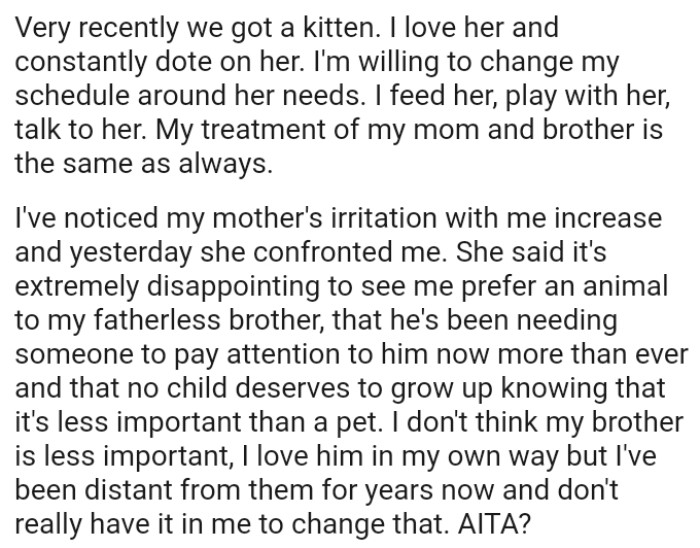
Below Are a Bunch of the Most Upvoted Comments from Other Redditors in Response to the Reddit Story Above
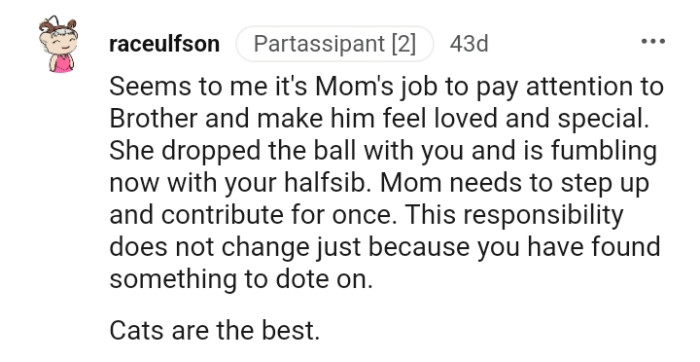
Accepting What the OP Is Willing to Give as Her Family Obligation
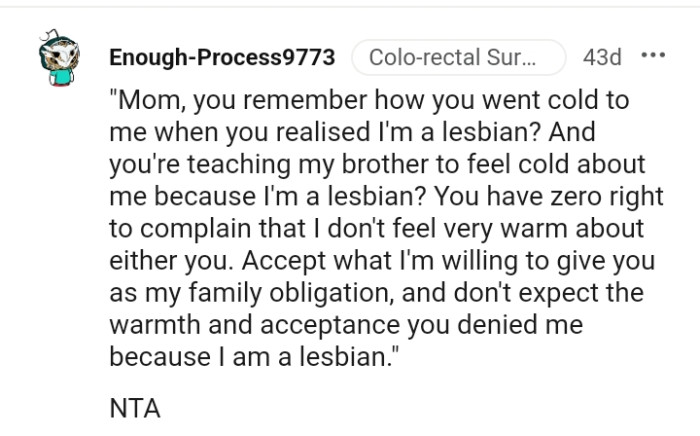
Conflict often arises when individual identities clash with family expectations. A clinical psychologist may emphasize the importance of open dialogue to bridge these gaps and facilitate understanding.
Encouraging family members to express their feelings in a safe environment can foster acceptance and reduce tensions.
Studies show that accepting family environments significantly contribute to the well-being of LGBTQ+ individuals.
According to research published in the American Journal of Public Health, supportive families can buffer against the negative mental health effects associated with rejection.
This finding emphasizes the need for open dialogues about sexual orientation and acceptance within families.
The OP Is Not the Cause of the Problem in This Relationship

The OP Still Chose to Financially Support Them After Everything
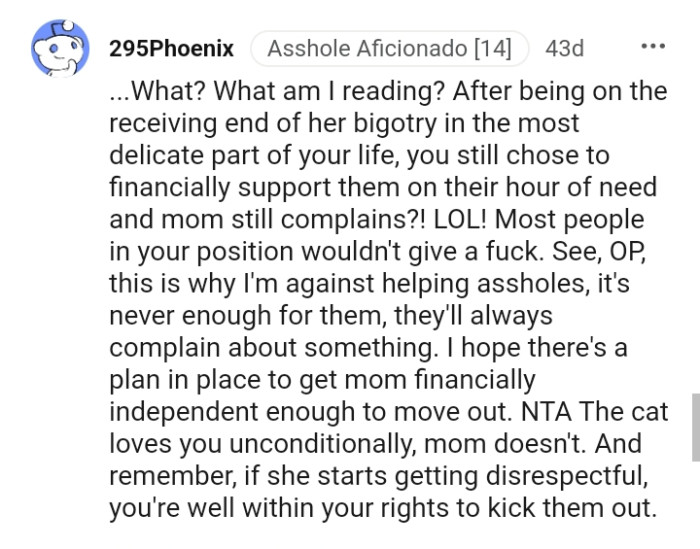
The OP Shouldn't Have Taken Them In
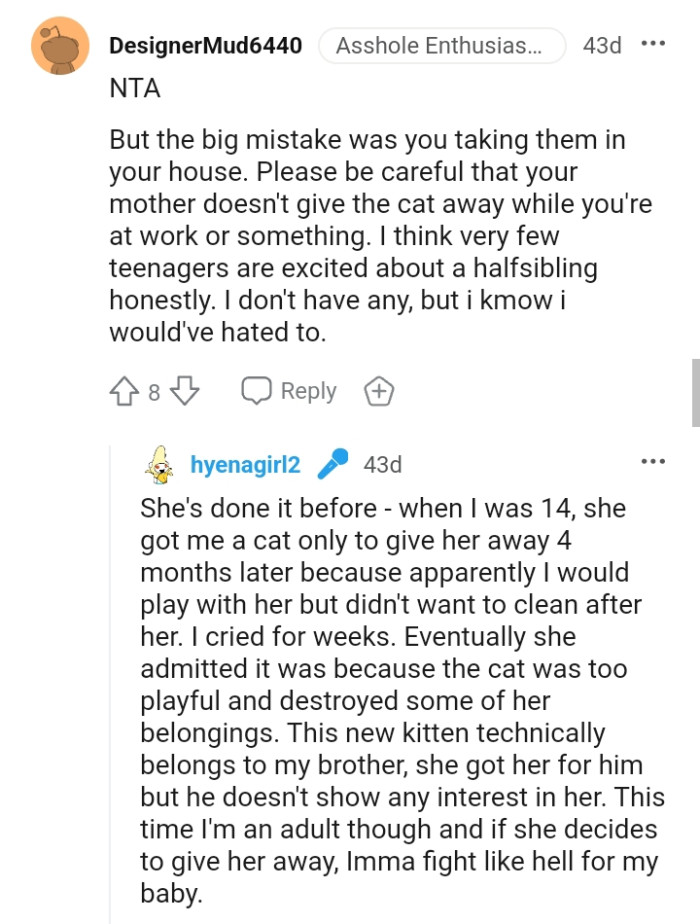
The Impact of Societal Norms on Family Acceptance
Societal norms can heavily influence familial acceptance, particularly regarding sexual orientation. Research indicates that families who align with conservative values may struggle more with accepting diverse identities.
This dynamic can lead to significant emotional challenges for individuals seeking acceptance, highlighting the need for education and open conversations within families.
Navigating Family Dynamics with Acceptance
To foster acceptance within families, experts recommend initiating conversations that focus on love and understanding.
Family members should strive to express their feelings honestly while also being open to learning about each other's experiences.
This approach can create a more inclusive environment where all members feel valued and respected.
Don't Be Afraid to Set Boundaries
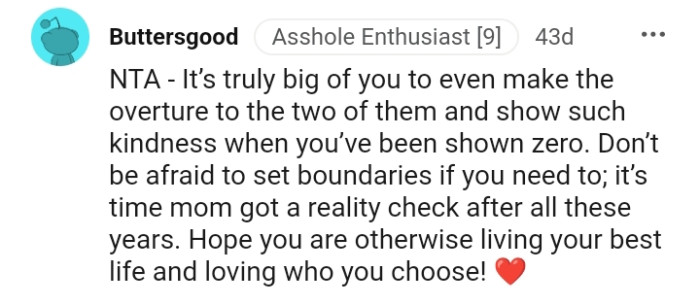
The OP Offered This Edit Later On...
Most of you have (logically) assumed they've come to live with me, but technically my mother sold her apartment in our hometown and bought a new one here. I gave her all my savings to help out, but her money and my brother's inheritance from his father were more, so they have 3/5 and 2/5 of the apartment respectively, and I have nothing. Before they came here, I was renting. I'm currently saving up money and waiting for my girlfriend to graduate so we can move out together. Also, it was my mother who got the kitten, but I've created quite the bond with her in the short time she's been here. Thank you all for the support!
The Cat Doesn't Treat the OP Poorly

OP's Mom Rejected Her Own Child
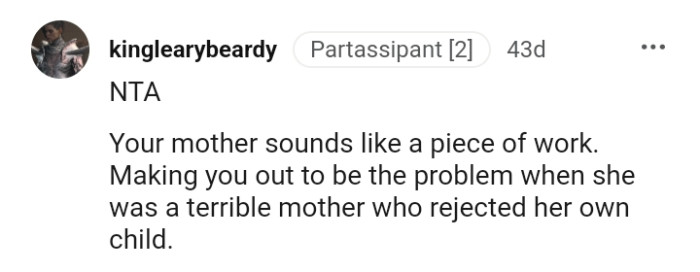
Practical solutions for fostering acceptance involve education and empathy-building exercises. Family therapy can create a safe space for discussing difficult topics while promoting understanding.
Encouraging family members to engage in conversations about diversity can facilitate greater acceptance and healing.
Additionally, seeking family therapy can provide a structured environment for discussing sensitive topics.
Research indicates that trained therapists can facilitate communication and help family members navigate their differences, ultimately fostering greater acceptance and understanding.
Creating a safe space for dialogue is essential for healing and strengthening familial bonds.
Don't Let the Door Hit You on Your Way Out
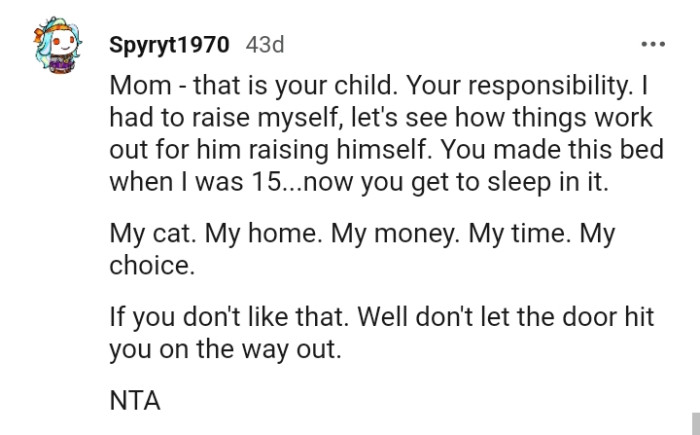
Apparently, OP cannot claim the kitten or move her anywhere, as her mom got the cat for her stepbrother. However, she promises to fight tooth and nail for her if her mom ever decides to try and rehome her or anything of the sort.
At the end of the back and forth, OP was declared not the AH, and you can share this post with your loved ones to get their verdicts as well.
Psychological Analysis
This scenario underscores the psychological toll that family rejection can take on individuals. It's essential for families to engage in open dialogues about acceptance, as these discussions can significantly impact the mental health and well-being of their loved ones.
Analysis generated by AI
Analysis & Alternative Approaches
Understanding the dynamics of family rejection is crucial for fostering acceptance and support.
As studies demonstrate, open communication and professional guidance can help families navigate these complex issues.
Psychological Analysis
This situation highlights the profound effects of familial rejection on individual identity formation. Addressing these issues through open communication and education can facilitate healing.
Promoting acceptance within families is crucial for emotional well-being and healthy relationships.
Analysis generated by AI
Analysis & Alternative Approaches
Ultimately, fostering acceptance within families requires open dialogue and education. Understanding the impact of societal norms can help families navigate these complex dynamics.
By prioritizing empathy and communication, families can work towards greater understanding and acceptance.



